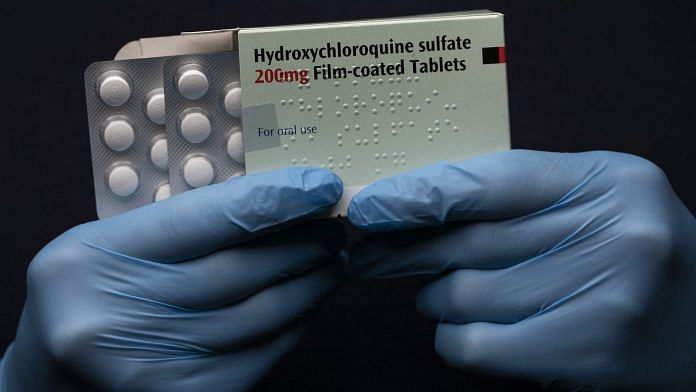New Delhi: Doctors in India who have used hydroxychloroquine (HCQ) both for preventive and therapeutic purposes against Covid-19 say the adverse effects that have been a big concern in the use of the drug don’t seem to be a problem. However, it’s not immediately clear if the drug is helping patients.
Their comments come after the anti-malarial drug suffered two more setbacks in the last few days. First, the US Food and Drug Administration (USFDA) knocked it off the emergency use authorisation (EUA) list of the USFDA, and then the World Health Organization (WHO) announced that the HCQ arm of the multi-nation Solidarity Trial would be stopped, for a second time.
Earlier this month, there was much drama after a couple of medical journals, including The Lancet, had to retract their papers on HCQ’s adverse impact.
India, however, continues to advise HCQ both as Covid prophylaxis (preventive drug) and treatment.
Dr Sujeet Jha, consultant endocrinology at Max Healthcare in the national capital, just completed a study on the efficacy of HCQ as a prophylactic on healthcare workers. The study is currently under review for publication in a medical journal.
“We did the study among healthcare workers in May when the prevalence was very low. I cannot reveal the data as it has been accepted for publication, but all I can say is that the results were not impressive,” said Jha.
“We are conscious that the low prevalence may have been a factor that is why we are doing a second phase now. However, I can confirm that we did not find any adverse reactions,” he said.
The Telangana government reported last month that 73 per cent healthcare workers who were administered the drug had stayed Covid-free despite regularly coming in contact with patients.
The first Indian Council of Medical Research advisory on HCQ’s use as a prophylaxis in frontline health workers came in March.
Also read: India sold over 22 crore HCQ tablets in last 3 months against 24 crore in all of 2019
‘No major side effects’
Dr S. Chatterjee, consultant, internal medicine, Indraprastha Apollo Hospital, echoed Dr Jha on adverse effects.
“We have used it both for prophylaxis and as a treatment modality. A study will need to be done to authoritatively say whether it works. I do not really know if the patient improved because of HCQ. However, I can say we did not see any major side-effects,” he said.
“The hype against the drug was about side-effects. To know whether it works as a prophylaxis, we need studies — maybe look at the Mumbai cops who were given the drug,” he added.
In April, Mumbai Police personnel were put on the drug but there is no systematic study as yet on whether it worked.
However, Dr Suni Jain, consultant medicine at Sir Ganga Ram Hospital said, “I do not know what is the use (of expanding HCQ use as a prophylaxis). One needs to follow up over the long term to see whether it works as a prophylactic for Covid-19.”
The HCQ developments
In its statement on stopping the HCQ arm of the Solidarity Trial, the WHO said Wednesday, “The trial’s Executive Group and principal investigators made the decision based on evidence from the Solidarity trial, UK’s Recovery trial and a Cochrane review of other evidence on hydroxychloroquine.”
It added that data from Solidarity (including the French Discovery trial data) and results from the UK’s Recovery trial both showed that HCQ doesn’t “result in the reduction of mortality of hospitalised COVID-19 patients, when compared with standard of care”.
On 15 June, the USFDA said the agency “determined that the legal criteria for issuing an EUA are no longer met”. This was followed by outrage from US President Donald Trump, who had famously said that he was using the drug as prevention. His comments had pushed the drug into the limelight globally.
This week’s developments came after The Lancet retracted a paper and investigators at the University of Oxford who looked at the efficacy of the drug for Covid under the Recovery trial gave a negative report. Questions though are now being asked in some scientific quarters about the dosage used in the latter.
India, however, has consistently reiterated its stand on using the drug for Covid patients — as late as 13 June — when the revised clinical management guidelines authorised its use alongside investigational drugs like remdesivir and tocilizumab.
On 22 May, guidelines for prophylactic use were also reiterated, expanding its use to all frontline workers, with an ECG after use for some days to check for any cardiac effects of the drug. The drug is known to cause irregular heart beat in some people.
Also read: Delhi’s Covid positivity rate sees a dip in just a few days as number of tests goes up



